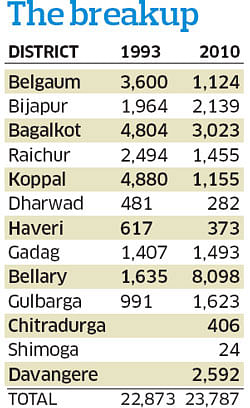Schemes fail to curb devadasi practice

While the State secretariat feels that the figures are bloated by the Women’s Development Corporation (WDC), which is said to be indulging in “siphoning off large amounts of funds in the name of devadasis,” experts believe that the numbers are much larger and the government is turning a blind eye to the whole matter.
A Rs 42.14-crore WDC proposal for various devadasi welfare schemes, which has been kept pending, was recently taken up for review by Chief Minister D V Sadananda Gowda, with the Chief Secretary having advised for a release of Rs 12 crore under the pension scheme.
However, senior officials are sceptic. Either the department concerned has failed to put an end to the practice, or non-beneficiaries are staking claim to the welfare schemes. There are serious concerns of pilferage at the administrative level, said an officer.
Illegal
The practice of dedicating oneself as a devadasi was declared illegal by Karnataka in 1982 through the Devadasi (Prohibition of Dedication) Act, 1982, while a 1993-94 survey had identified 22,873 devadasis in 10 districts. In 2007-08, another survey initiated by the departments of Women and Child Welfare, Rural Development and Panchayat Raj and the district administrations determined 23,787 more devadasis in 13 districts including in three new districts, Davangere, Chitradurga and Shimoga.
Officials said the numbers were, however, “in excess” and that the entire process was re-verified in February 2010 to arrive at the figure of 23,787.
The population had been over-estimated, with the numbers being over 28,000. On verification it was ascertained that while some individuals “had permanently disappeared, some had expired”. The excess numbers were also because of “some names being duplicated”.
Skewed surveys
According to Dr Jogan Shankar, Professor of Sociology of Deprived Groups in Mangalore University (currently on deputation to Bangalore University), who has conducted extensive studies on the subject, said the State government was touting its welfare measures and schemes in a “lucrative” and “attractive” manner, which is not essentially serving the purpose.
“The government surveys conducted so far on the devadasis are skewed. They are not conducted by qualified people or people with experience. Such surveys should ideally be conducted by independent organisations. Either the government has left out genuine devadasis by not counting them, or it has included non-devadasis, who falsely claim to be devadasis because of the attractive schemes doled out by the government,” he said.
Prof Shankar also said that 30 years ago, the population of devadasis only in the Karnataka-Maharashtra border was estimated to be 1.5 lakh.
System persists
“The numbers would have cumulatively increased. Though mass dedications have stopped, women are still devoting themselves to the practice indiscreetly in small ‘Devi’ temples. Both the social welfare department and the department of women and child development have misused and abused the funds allocated for the devadasis over the years. The government has only made a lot of noise about the various programmes. It has, however, failed to execute them effectively,” he added.
He also said these welfare measures only created more dependency.
Bad implementation
“The devadasis will never learn to develop self-respect. The government has given much publicity to the housing project, but it hasn’t been implemented effectively. In the hope that they will be provided for, the devadasis have stopped making efforts to earn an honest living,” he said.
The government has also failed to frame rules and regulations to the Karnataka Devadasis (Prohibition of Dedication) Act 1982, till date.
“This will make it difficult to adopt procedures and methods while drawing up programmes,” added Dr Shankar.
Dedicated to a deity
Devadasi system is a religious tradition in which girls are "married" and dedicated to a deity or to a temple. Devadasi is a Sanskrit term denoting female servant of deity. This cult is prevalent even today throughout India with some regional variances.
Deccan Herald is on WhatsApp Channels| Join now for Breaking News & Editor's Picks